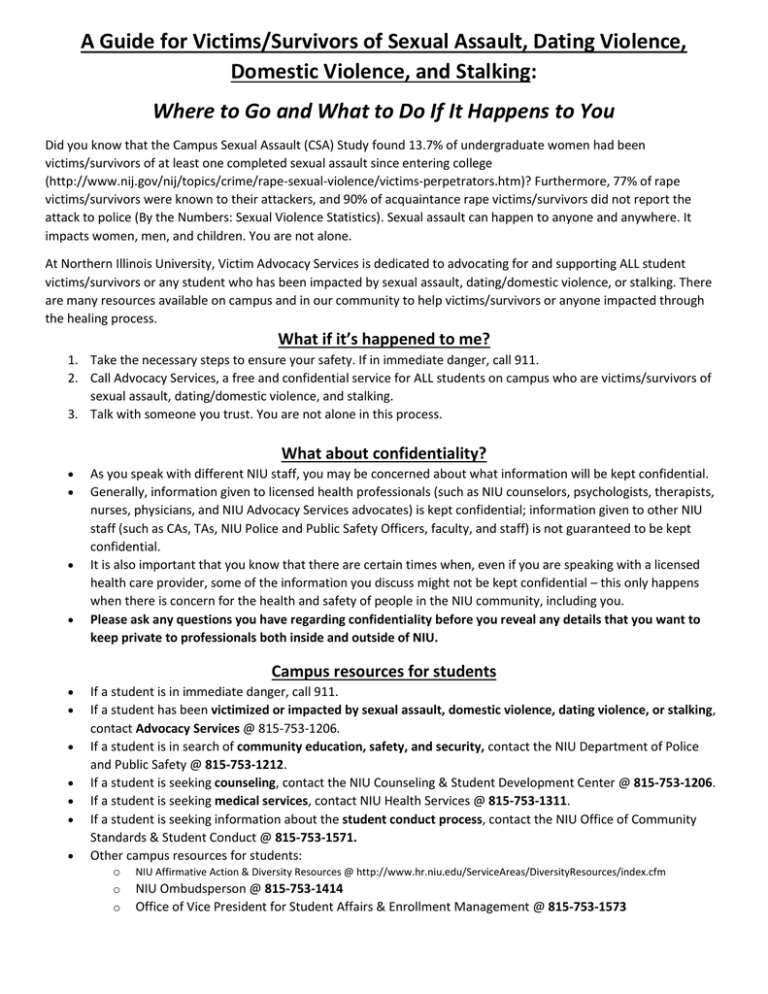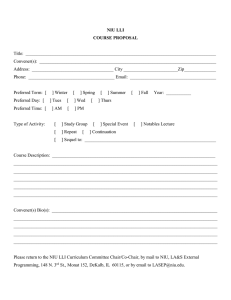
A Guide for Victims/Survivors of Sexual Assault, Dating Violence,
Domestic Violence, and Stalking:
Where to Go and What to Do If It Happens to You
Did you know that the Campus Sexual Assault (CSA) Study found 13.7% of undergraduate women had been
victims/survivors of at least one completed sexual assault since entering college
(http://www.nij.gov/nij/topics/crime/rape-sexual-violence/victims-perpetrators.htm)? Furthermore, 77% of rape
victims/survivors were known to their attackers, and 90% of acquaintance rape victims/survivors did not report the
attack to police (By the Numbers: Sexual Violence Statistics). Sexual assault can happen to anyone and anywhere. It
impacts women, men, and children. You are not alone.
At Northern Illinois University, Victim Advocacy Services is dedicated to advocating for and supporting ALL student
victims/survivors or any student who has been impacted by sexual assault, dating/domestic violence, or stalking. There
are many resources available on campus and in our community to help victims/survivors or anyone impacted through
the healing process.
What if it’s happened to me?
1. Take the necessary steps to ensure your safety. If in immediate danger, call 911.
2. Call Advocacy Services, a free and confidential service for ALL students on campus who are victims/survivors of
sexual assault, dating/domestic violence, and stalking.
3. Talk with someone you trust. You are not alone in this process.
What about confidentiality?
As you speak with different NIU staff, you may be concerned about what information will be kept confidential.
Generally, information given to licensed health professionals (such as NIU counselors, psychologists, therapists,
nurses, physicians, and NIU Advocacy Services advocates) is kept confidential; information given to other NIU
staff (such as CAs, TAs, NIU Police and Public Safety Officers, faculty, and staff) is not guaranteed to be kept
confidential.
It is also important that you know that there are certain times when, even if you are speaking with a licensed
health care provider, some of the information you discuss might not be kept confidential – this only happens
when there is concern for the health and safety of people in the NIU community, including you.
Please ask any questions you have regarding confidentiality before you reveal any details that you want to
keep private to professionals both inside and outside of NIU.
Campus resources for students
If a student is in immediate danger, call 911.
If a student has been victimized or impacted by sexual assault, domestic violence, dating violence, or stalking,
contact Advocacy Services @ 815-753-1206.
If a student is in search of community education, safety, and security, contact the NIU Department of Police
and Public Safety @ 815-753-1212.
If a student is seeking counseling, contact the NIU Counseling & Student Development Center @ 815-753-1206.
If a student is seeking medical services, contact NIU Health Services @ 815-753-1311.
If a student is seeking information about the student conduct process, contact the NIU Office of Community
Standards & Student Conduct @ 815-753-1571.
Other campus resources for students:
o
o
o
NIU Affirmative Action & Diversity Resources @ http://www.hr.niu.edu/ServiceAreas/DiversityResources/index.cfm
NIU Ombudsperson @ 815-753-1414
Office of Vice President for Student Affairs & Enrollment Management @ 815-753-1573
Community resources for students
If a student is seeking health services, evidence collection, STI testing, and referrals, contact Kishwaukee
Community Hospital @ 815-758-8671.
If a student is seeking victim/survivor community services, medical and legal advocacy, a 24-hour crisis line,
and support, contact Safe Passage @ 815-756-5228.
How to handle triggers
(Benchmarked from an approved OVW website)
After experiencing a traumatic event, such as a sexual assault, you might find yourself reacting to situations in
ways you would not have before the assault. You may experience flashbacks, which are when memories of past
traumas feel as if they are taking place in the current moment. Flashback can be triggered by a touch, smell,
color, or anything that reminds you of the trauma.
If you have a flashback, try grounding yourself and reentering the present moment using sensory
techniques, which help you reenter the present moment:
o Focus on the present (not the trauma).
o Take 3 slow, deep breaths.
o Try doing an activity that changes your current experience in any of your five senses.
Sight: Name 5 things you see in the room.
Taste: Drink something hot or cold, eat some strong tasting candy, or suck on ice.
Touch: Run your hand across something highly textured, or pet your dog.
Smell: Use scented candles, lotion, bubble bath, aromatherapy, or food.
Hear: Listen to music, someone’s voice, or any noise happening around you (cars,
barking, etc.).
Suggested ways to exercise care
(Benchmarked from an approved OVW website)
The most important piece of healing from trauma is to be gentle and patient with yourself. When you need
some extra comfort, you might:
o Turn on music, light candles or incense, and run yourself a warm bath.
o Drink hot tea or hot chocolate.
o Go to a special place (actually or in your mind).
o Hug a stuffed animal or a person who makes you feel safe.
o Cry
o Use art, journaling, or other creative outlets.
o Watch television.
o Clean the house.
o Exercise
o Spend time with family or friends.
At other times you might need to get your mind off of the trauma, and that’s okay, too. You can watch TV, clean
the house, go for a walk, or play cards with a friend. Just know that healing from trauma is possible. It will heal
with time.



